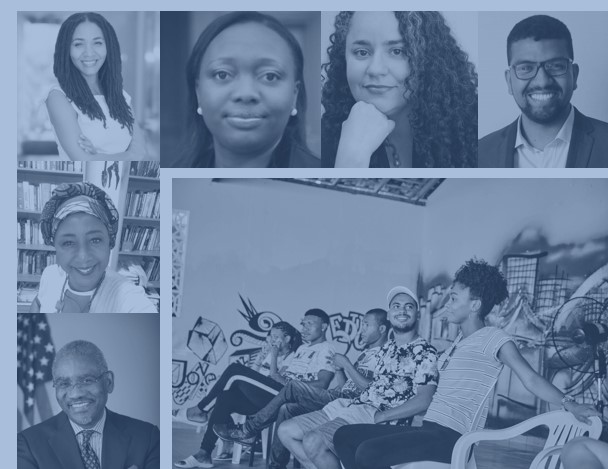Measuring Discrimination: Race and Data in Brazil
Though racial equality is improving in Brazil, there is significant room for progress.
This post is also available in: Español
On March 26, 2021, the Dialogue hosted the online event “Afro-descendants: Striving for Equality in Latin America” in partnership with the Inter-American Foundation (IAF). Paloma Adams-Allen, IAF president and CEO, gave introductory remarks and introduced keynote speaker Congressman Gregory W. Meeks (D-NY-5). Michael Shifter served as moderator for the the panel, which included: Judith Morrison, senior advisor for social development in the gender and diversity division at the Inter-American Development Bank; Paula Moreno, president of Manos Visibles and former Colombian minister of culture; Marco Antonio Ramírez, president of Ashanti Perú – Red Peruana de Jóvenes Afrodescendientes; and María Sylvia de Oliveira, president of the GELEDÉS Instituto da Mulher Negra. Participants focused on addressing the pre- and post-Covid challenges and opportunities facing Afro-descendants in the region, including access to higher education, public office, corporate boardrooms, economic opportunity, formal employment, clean water, and quality health services.
Congressman Meeks, who serves as chairman of the House Foreign Affairs Committee, stressed the interconnected outcomes of Latin America and its Afro-descendant communities, stating, “when we lift them up, and eliminate racial and ethnic inequalities, this contributes to building stronger economies and more just societies.” Meeks also applied the theme of interconnectedness to hemispheric relations. He explained that the region is simultaneously informed by “a common history and legacy” and a commitment to “freedom, equality, representation, and prosperity.” He described the Biden administration’s opportunity to pursue an inclusive Western-hemisphere policy—embracing cooperation with foreign partners and including the voices and needs of Afro-descendants. A level playing field for Afro-descendants promises not only greater equality but greater outcomes for Latin America as a whole.
Morrison gave a data-driven overview of the state of Afro-descendent communities, who comprise between 20 and 30 percent of Latin America’s population. Despite high levels of poverty, the rate of extreme poverty among Afro-descendants had declined in the years prior to the pandemic. Significant progress has also been made in the areas of access to education and educational outcomes. Even with these educational advances, access to leadership roles in the private sector continues to lag. Morrison highlighted data from countries where longitudinal data was available for the Afro-descendent population, allowing comparisons over time. In Brazil, for example, the proportion of Afro-descendent supervisors and managers (26 and 6 percent, respectively) falls far short of Brazil’s general population, which is majority Black. Other concerns include the number of Afro-descendants outside of the formal labor sector and the lack of quality data on the impact of Covid-19 differentiated by race and ethnicity. Factors contributing to the disproportionate impact of the pandemic on Afro-descendants include the lack of employment formality and their outsized participation as frontline workers.
Moreno recognized the progress that has been made, highlighting the strengthening of organizations that advocate for Afro-descendants, the formation of new associations and organizations, and the increase in government representation as evidenced by her own role as the first Black Colombian minister. Despite this, conditions have not improved for most Afro-descendants, a reality underscored by the effects of the Covid-19 pandemic. Moreno stated that this progress needs to become “more natural and less exceptional.” She concluded by affirming that Afro-descendant empowerment must be multifaceted, whether that be in government, the private sector, communications, or technology.
Ramírez compared the lack of access to education during Covid-19 to preexisting disparities in educational outcomes. He addressed the exclusion of Afro-descendants from Covid-19 policy decisions, which has resulted in inequitable policy outcomes. Effective policy requires that “the youth be active participants in public policy rather than only beneficiaries of public policy.” He last discussed the importance of representation to inspire Afro-descendent youth and make Afro-descendent populations more visible.
De Oliveira gave an overview of the work to empower Afro-Brazilians. Her organization GELEDÉS has been involved in advances in education and political representation for Black women. Nonetheless, Covid-19 has highlighted inequalities that prevent Afro-Brazilians from protecting themselves against the virus, resulting in higher rates of Covid-related mortality and unemployment. Black women and girls are most impacted, facing increased levels of domestic violence, physical and mental health concerns, unemployment, and school absence. De Oliveira believes that Covid-19 will worsen access to education for Afro-Brazilians, whose digital access is relatively low. De Oliveira extended her gratitude for the support of the IAF and of Black Americans in their efforts to promote equality and remarked on the solidarity demonstrated by Congressman Meeks in his keynote address.
Though racial equality is improving in Brazil, there is significant room for progress.
This post is also available in: SpanishEste livro traz uma reflexão sobre as desigualdades raciais contidas nos indicadores de escolarização da população brasileira. Na verdade, dentro do atual estado-da-arte do debate sobre o tema dos indicadores educacionais de nosso país já existe uma plena compreensão sobre as pronunciadas assimetrias presentes…
Fiscal policy played an important role in reducing poverty and inequality in Brazil (Higgins and Pereira, 2014) over the last fifteen years, but how much redistribution and poverty reduction is being accomplished across ethnic groups?
 Main photo: Inter-American Foundation
Main photo: Inter-American Foundation
